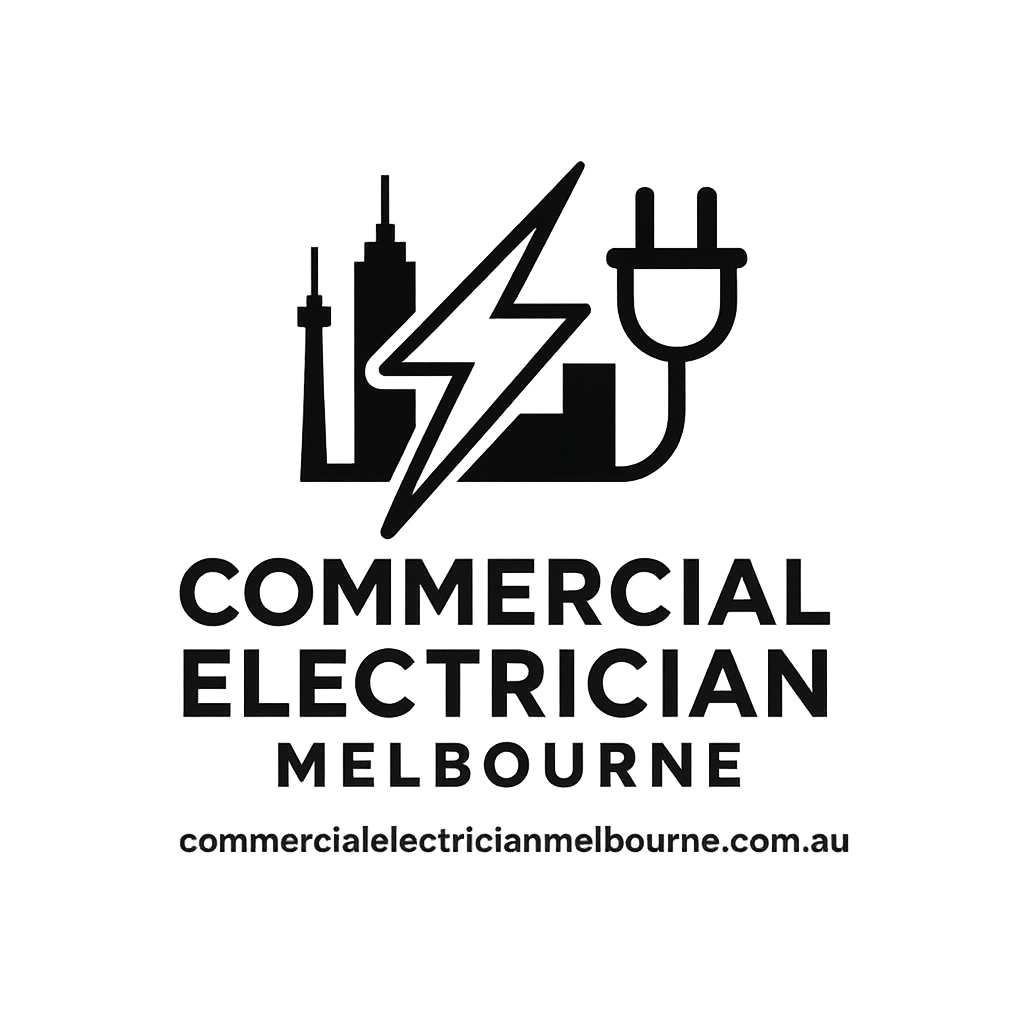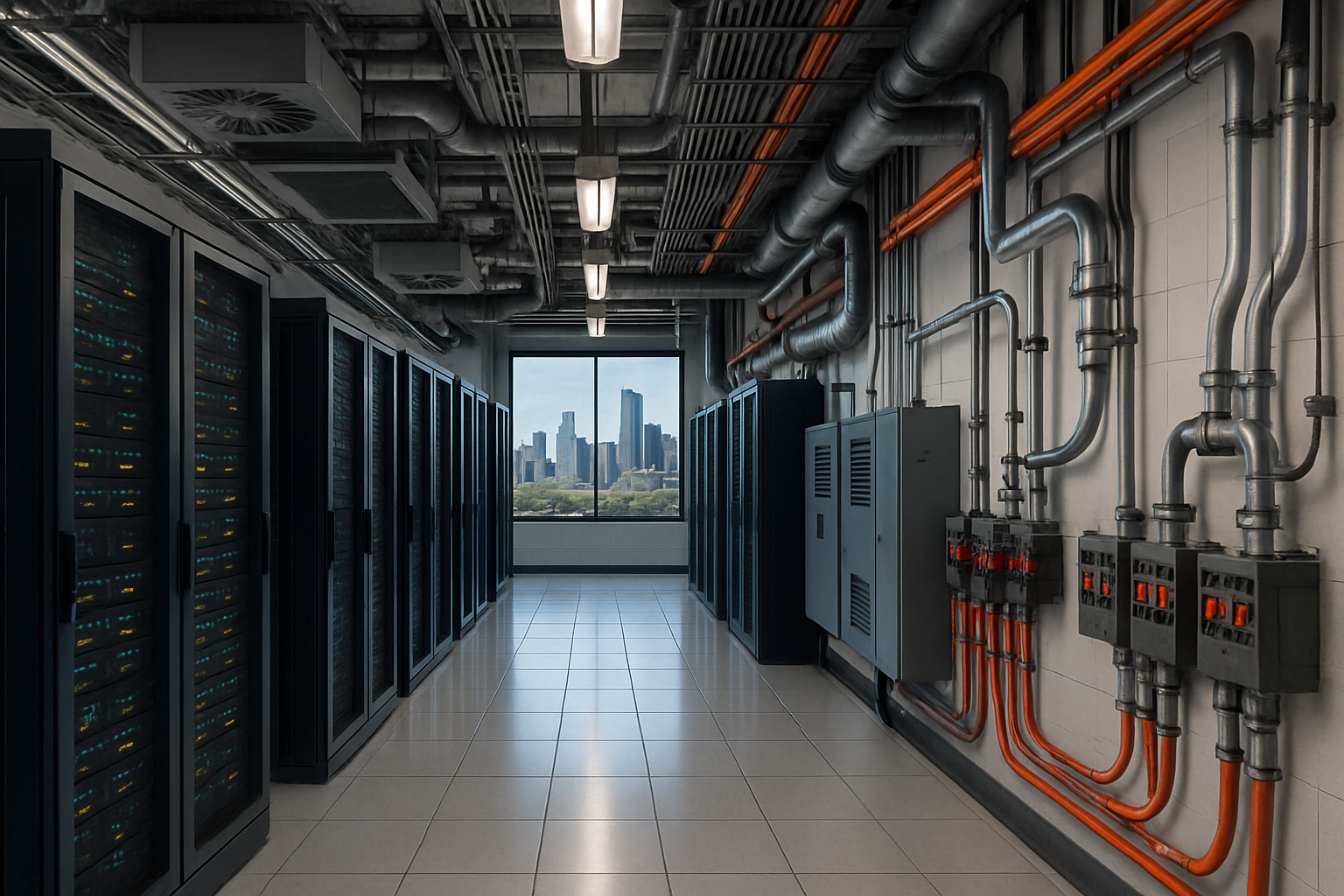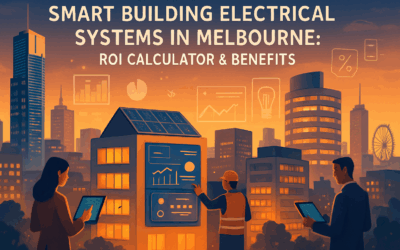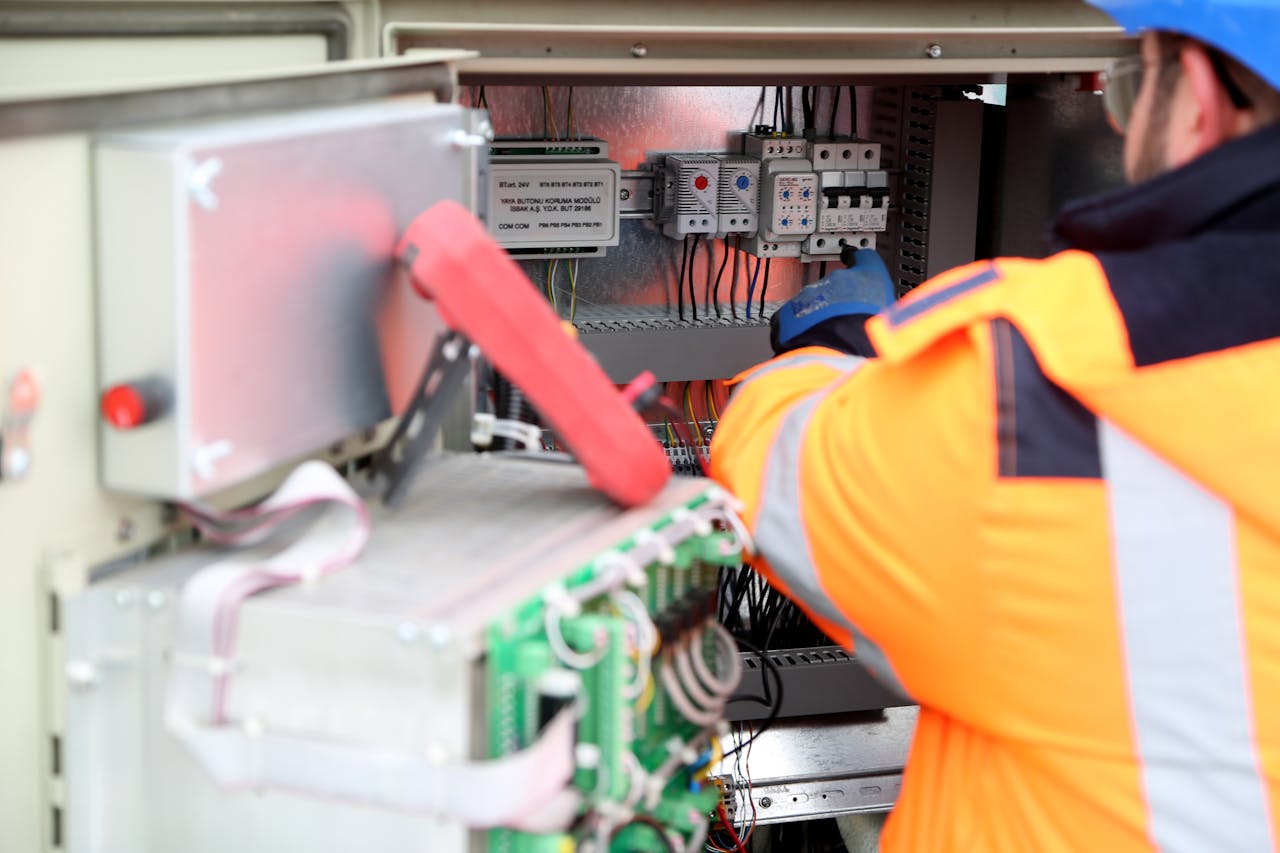Why This Subject is Critical for Business Owners
Understanding Data Center Electrical Installation
Key Components in a Server Room Setup
Features and Benefits of Modern Electrical Infrastructure
Preparing for Your Data Center Electrical Project
Local Regulations, Best Practices and Compliance in Melbourne
Tips for Finding the Right Commercial Electrician in Melbourne
Common Electrical Challenges and How to Solve Them
Future-Proofing Your Data Center: Innovations and Trends
If you’re a small business owner in Melbourne who’s considering setting up a data center or improving your existing server room, you know how crucial it is to have a properly designed and maintained electrical infrastructure. In today’s digital age, your IT systems’ performance, reliability, and safety depend on a robust electrical system. This means working with experienced commercial electricians in Melbourne who specialize in data center electrical installation can make all the difference. In this post, we’ll dive into the essentials of server room setup, explore features and benefits of modern electrical design, and share practical tips on selecting the right experts for your project. By understanding the key aspects of data center electrical installation, you can ensure your technology infrastructure is reliable, secure, and future-proof.
Why This Subject is Critical for Business Owners
As a small business owner, you likely depend on a wide range of digital tools and IT systems for your daily operations. When putting together or revamping a data center or server room, one of the most critical factors is ensuring the electrical system is equipped to handle your tech equipment and can withstand unexpected power interruptions.
Investing the time and resources in professional data center electrical installation is not just about meeting current business demands—it’s about future-proofing your infrastructure. A reliable electrical system:
- Minimizes downtime with properly designed power distribution and emergency power systems.
- Protects critical systems from voltage fluctuations and surges.
- Ensures safety for staff and equipment.
- Provides scalability for future expansion.
Moreover, the expertise of commercial electricians in Melbourne can ensure that your server room setup adheres to strict safety regulations and local codes, reducing risk and helping your business avoid costly delays and repairs.
Understanding Data Center Electrical Installation
Before diving into specific features and benefits, it’s important to understand what data center electrical installation really encompasses and why meticulous planning is crucial.
What Is Data Center Electrical Installation?
Data center electrical installation involves setting up an electrical infrastructure that supports the operation of a data center or server room. This includes everything from power distribution units (PDUs), circuit breakers, and surge protection devices to ensuring proper integration of UPS (uninterruptible power supply) systems, backup generators, and even high-voltage electrical solutions where necessary.
Key Objectives
- Ensuring Continuous Power Supply: The main goal is to guarantee that your data center has a reliable and continuous power supply. Any interruption can lead to severe downtime.
- Optimizing Power Distribution: Proper design ensures that power is distributed evenly across all equipment, mitigating risks associated with electrical load balancing.
- Safety and Compliance: compliance with local safety regulations (such as those stipulated by the Energy Safe Victoria and other local codes) is paramount. This guarantees that the installation minimizes hazards such as electrical faults and fires.
- Efficiency and Scalability: Modern systems prioritize energy efficiency and are built to scale, keeping pace with your business growth.
Why Work with Experts?
Engaging a specialist in commercial electricity installation ensures that your project avoids common pitfalls. Experienced Melbourne electricians have in-depth knowledge of server room wiring, electrical fault detection, and power monitoring systems—all of which are indispensable for a successful setup.
Key Components in a Server Room Setup
When planning your data center electrical installation, consider every component that plays a role in powering and protecting your server room. Here are some critical components:
1. Power Distribution and Circuit Breakers
A reliable power distribution system is the backbone of your data center:
- Circuit Breakers: These ensure that the system can safely disconnect power in case of overload, preventing equipment damage and electrical fires.
- Load Balancing: Properly balanced loads help distribute power evenly, protecting sensitive IT equipment.
2. Uninterruptible Power Supply (UPS) Systems
UPS systems are vital for maintaining your server room operations during temporary utility outages. They:
- Provide short-term backup power.
- Protect equipment from voltage spikes.
- Serve as a transitional power source until backup generators can take over.
3. Backup Generators
For longer-term outages, a backup generator is essential. These systems should be tested regularly to ensure they kick in when needed, minimizing any potential downtime.
4. Surge Protection
Power surges can damage delicate electronic equipment. Surge protection devices safeguard your server room by absorbing voltage spikes and preventing equipment failure.
5. Emergency Power Systems
Emergency power systems include automatic transfer switches (ATS) that detect power failures and facilitate a smooth transition to backup power sources.
6. Cooling Systems
Although primarily part of the data center’s HVAC system, cooling systems play a crucial role in electrical installations:
- Data Center Cooling: Proper cooling is essential to maintain the performance and longevity of electrical components. Overheating can cause electrical failures and reduce the lifespan of critical components.
7. Cable Management
Effective cable management ensures not only a cleaner setup but also aids in fault detection and maintenance efforts:
- Server Rack Installation: Secure, labeled, and organized cabling reduces the risk of errors during maintenance and upgrades.
- Electrical Wiring: Proper routing of electrical wiring reduces risks associated with fire and electrical faults.
Features and Benefits of Modern Electrical Infrastructure
Modern data center electrical installations come with several features that offer significant benefits to your business. Here’s a detailed look:
Reliable Power Distribution
- Consistent Power Delivery: Avoids power fluctuations that can damage your equipment.
- Improved Efficiency: Optimized load balancing leads to more efficient power use, saving on energy costs.
- Built-In Redundancy: Dual power feeds and redundant circuits ensure that a single failure won’t take down your entire system.
Enhanced Safety and Compliance
- Regulatory Compliance: Adhering to local codes ensures your data center meets all safety standards laid out by Victorian authorities and relevant Australia standards.
- Minimized Hazard Risks: Regular electrical testing and preventative maintenance reduce fire risks and prevent potential electrical faults.
Energy Efficiency
- Cost Reduction: Energy-efficient designs help reduce operational costs.
- Green Credentials: Using state-of-the-art, energy-efficient technology can enhance the company’s reputation as an environmentally conscious business.
Scalability and Future-Proofing
- Modular Design: Systems designed for easy upgrades as your business grows.
- Future Innovations: Easy integration of next-generation technologies without significant overhauls.
Enhanced Power Management
- Real-Time Monitoring: Utilize technology to keep an eye on power consumption, allowing for proactive fault detection and maintenance.
- Optimized Power Usage: Smart power management systems can direct power where it is needed most, ensuring operational continuity during peak demand periods.
Preparing for Your Data Center Electrical Project
Proper preparation is key to a smooth server room setup. Below are several strategic steps to ensure you’re ready to work with your chosen commercial electricians in Melbourne.
Assess Your Current and Future Needs
Before you start any installation work, take the time to:
- Inventory Your Equipment: Assess what’s currently housed in your data center, along with any anticipated upgrades.
- Determine Future Requirements: Consider the scale of future expansion, so your electrical infrastructure is built to handle both current and future loads.
- Plan for Redundancy: This includes backup power sources like UPS systems and generators.
Conduct a Detailed Site Survey
A comprehensive site survey is essential. Tasks include:
- Surveying the Electrical Load: Ensure your electrical contractors perform an in-depth load calculation to determine the capacity required.
- Checking Existing Infrastructure: Evaluate if your current wiring and power distribution systems can be upgraded or if a new installation is necessary.
- Environmental Assessments: Look into factors such as room ventilation, cooling needs, and potential fire hazards.
Budgeting and Cost Planning
Electrical installation, especially in a critical infrastructure such as a data center, is an investment. Consider:
- Cost of Materials: High-quality equipment such as surge protection devices and circuit breakers might cost more up front but offer long-term savings.
- Labour Costs: Skilled labour from reputable commercial electricians in Melbourne can prevent costly mistakes.
- Future Upgrades: Keep a budget reserve for ongoing maintenance and future upgrades.
Establish a Project Timeline
Setting clear milestones is important:
- Initial Planning: Scope out the project in consultation with your electrician and IT team.
- Equipment Procurement: Plan for the lead time required to acquire specific components like UPS systems and backup generators.
- Installation and Testing: Schedule times for installation as well as thorough testing before the data center goes live.
Communicate With Stakeholders
If you have multiple parties reliant on the data center’s performance (e.g., IT teams, management, and facility managers):
- Regular Updates: Keep everyone informed about project timelines and any potential downtime.
- Collaborative Planning: Involve key stakeholders in early planning to ensure that all functional needs are met.
Local Regulations, Best Practices and Compliance in Melbourne
Melbourne, like many major cities, has its own set of electrical codes, standards, and best practices. Ensuring your data center electrical installation complies with these local requirements is essential for safety and efficiency.
Key Regulatory Bodies and Regulations
- Energy Safe Victoria (ESV): The main regulatory body overseeing electrical installations. Ensure all work is compliant with ESV guidelines.
- Australian Standards (AS/NZS): These standards outline the requirements for electrical installation, testing, and maintenance. Relevant standards for data centers include those for protective equipment, high-voltage installations, and emergency power systems.
- Local Council Regulations: Check with your local council in Melbourne, as there might be additional local requirements for commercial spaces and data centers.
Best Practices for Data Center Electrical Installation
- Regular Electrical Testing: Schedule routine tests for circuit breakers, UPS systems, and backup generators to ensure they function as intended.
- Preventative Maintenance Programs: Develop maintenance schedules with your electrical contractors to identify and resolve potential issues before they become major problems.
- Document Everything: From installation specifications to maintenance logs, ensure all work is well-documented. This documentation will be invaluable during inspections or when planning future upgrades.
- Staff Training: Train your in-house team on basic electrical safety and emergency procedures to minimize risk during unforeseen incidents.
Practical Compliance Steps
- Certification: Ensure that all equipment, from power distribution units to surge protectors, meets the required certifications for safety and performance standards.
- Inspection by Authorities: After installation, arrange for inspections by local authorities to verify compliance.
- Plan for Redundancy: Adhere to local guidelines on redundant power supplies and emergency shutdown procedures to safeguard against power failures.
Tips for Finding the Right Commercial Electrician in Melbourne
Choosing the right commercial electrician who understands the specific needs of a data center is crucial. Here are some practical tips to ensure you make an informed decision:
Do Your Homework
- Experience in Data Centers: Look for electricians who have deep experience with server room electrical layout, UPS systems, and redundant power systems.
- Local Reputation: Seek recommendations from local small business forums, check online reviews, and ask fellow business owners about their experiences with local professionals.
- Industry Certifications: Ensure that the company holds the necessary licenses and certifications. In Melbourne, this means compliance with both state and national electrical standards.
Detailed Consultation
- Site Visit: Invite potential electricians to conduct a site inspection. This allows them to assess your specific needs and challenges, and gives you an opportunity to evaluate their approach.
- Clear Proposal: Ask for a detailed written proposal that outlines the scope of work, costs, timelines, and contingencies.
- Case Studies: Request case studies or past examples of similar data center electrical projects to gauge their expertise.
Communication and Customer Service
- Responsive Communication: Choose a company that keeps the lines of communication open. You should feel comfortable discussing concerns and receiving prompt updates.
- Long-Term Support: The installation is only the beginning. Look for service providers who offer ongoing maintenance, electrical testing, and support.
- Local Presence: A local office or service center in Melbourne can significantly reduce response times in case of emergencies.
Common Electrical Challenges and How to Solve Them
Even with planning, electrical installations in data centers can face challenges. Here are some common issues and tips on addressing them:
Overload and Imbalanced Loads
- Challenge: Overloading circuits or imbalanced power loads can lead to frequent circuit breaker trips and potential equipment damage.
- Solution: Engage experts to calculate your electrical load accurately. Install load balancing systems and use intelligent PDUs that monitor and distribute power efficiently.
Inadequate Backup Solutions
- Challenge: Many data centers experience a lack of redundancy in power supply, leading to serious downtime during outages.
- Solution: Invest in robust UPS systems and backup generators. Regularly test these systems to ensure they provide the necessary power during an outage.
Surge and Voltage Fluctuations
- Challenge: Spikes in power can cause irreversible damage to sensitive electronic components.
- Solution: Install surge protection devices and voltage regulators. Monitoring systems can alert you of any anomalies before they escalate.
Inadequate Cooling Systems
- Challenge: Inadequate cooling can lead to overheating, which may compromise the electrical system’s performance.
- Solution: Incorporate efficient data center cooling strategies. Ensure that your electrical contractors work hand-in-hand with HVAC professionals to design an integrated cooling and power management system.
Poor Cable Management
- Challenge: Disorganized wiring can complicate maintenance and increase the risk of short circuits or electrical faults.
- Solution: Implement a structured cabling system with proper labeling, cable trays, and regular audits to ensure everything remains organized.
Future-Proofing Your Data Center: Innovations and Trends
Investing in forward-thinking electrical installations can help your data center adapt to future technology needs. Here are some trends and innovations worth considering:
Energy-Efficient Data Centers
- Green Technologies: Modern installations increasingly incorporate energy-efficient components, reducing operational costs and environmental impact.
- Smart Monitoring: Utilize advanced power monitoring systems that employ IoT sensors to track energy usage in real-time, allowing for proactive adjustments.
Modular and Scalable Designs
- Flexibility: Modular designs allow you to add or remove capacity as needed without overhauling the entire electrical system.
- Cost-Effective Upgrades: Scalability ensures that future expansions are more straightforward and less expensive, protecting your long-term investment.
Improved Backup and Redundancy
- Hybrid Power Solutions: Consider installations that combine traditional backup generators with renewable energy sources, such as solar panels, where feasible.
- Enhanced Redundancy: Modern systems are now built with multiple layers of redundancy, ensuring that a single point of failure does not compromise system integrity.
Integration with Smart Technologies
- Automation: Automation in power management, such as automatic transfer switches, can reduce the reliance on manual intervention during outages.
- Remote Management: Cloud-based platforms enable remote monitoring and control over your data center’s electrical systems, providing quick response capabilities in emergencies.
Conclusion
Setting up a secure and efficient data center in Melbourne is no small feat, especially when it comes to ensuring that the electrical installation is robust enough to support modern IT infrastructure. With the right planning, expert consultation, and adherence to local regulations and best practices, you can build a server room that not only supports your current operations but is also scalable for future growth.
Key takeaways for small business owners include:
- Recognizing the importance of a reliable and well-designed electrical infrastructure.
- Engaging experienced commercial electricians in Melbourne who understand nuances like server room wiring, load balancing, UPS systems, and surge protection.
- Preparing properly by assessing your needs, conducting a detailed site survey, and ensuring compliance with local codes set by bodies like Energy Safe Victoria and Australian Standards.
- Embracing future-proof solutions such as modular designs, smart power management systems, and redundant backup solutions.
Remember, your data center is the heart of your digital operations. By investing in proper electrical installation and maintenance, you’re not just keeping the lights on; you’re safeguarding your business’s future. Whether you’re expanding an existing setup or starting from scratch, the right electrical infrastructure is integral to ensuring continuous performance, safety, and efficiency.
If you’re ready to take the next step, reach out to trusted commercial electricians in Melbourne who specialize in data center electrical installations. Their local expertise, proven track record, and commitment to innovation can help you navigate the complex landscape of server room setup. In doing so, you not only meet today’s demands but also prepare your business for the technological challenges and opportunities of tomorrow.
By keeping abreast of evolving electrical technologies and trends, and by prioritizing energy efficiency and regulatory compliance, you can create a data center environment that is both resilient and forward-thinking. Get in touch with an experienced electrical contractor, review your current infrastructure, and plan strategically for upgrades. With the right investments, your server room will deliver reliable performance, reduce downtime, and provide peace of mind as your business continues to grow in an increasingly digital world.
Taking proactive steps in developing your data center’s electrical infrastructure isn’t just about avoiding technical problems—it’s a business strategy that impacts your bottom line. Reliable power, efficient design, and rigorous safety standards are investments that pay off in the form of uninterrupted operations and improved overall reliability. So, whether you’re planning a new installation or upgrading an old one, remember that a well-designed electrical system is the backbone of any effective server room setup.
By following the practical tips shared in this post and working with the best local experts, you’ll be well on your way to building a data center that powers your business success. The next time you consider the phrase “data center electrical installation Melbourne,” know that you have the roadmap to a robust, efficient, and scalable server room setup that can meet today’s demands and the challenges of tomorrow.
Feel free to share your thoughts, ask questions, or reach out for a personalized consultation on your project. Your data center’s performance is too important to leave to chance—invest in quality electrical installation and enjoy the peace of mind that comes with a secure, efficient, and future-ready setup. Enjoy the journey towards powering your business with the best in Melbourne’s electrical expertise!





0 Comments